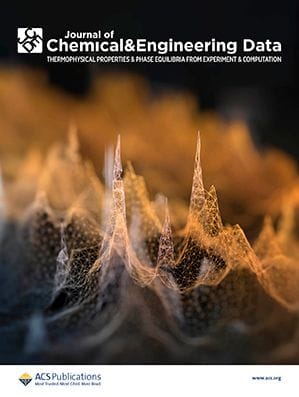Learn more about Professor Tiwikrama in an exclusive interview and browse the 2024 winner's published research in ACS Journals.

The Journal of Chemical & Engineering Data Early Career Award is presented annually to one outstanding early career scientist/engineer conducting experimental or computational research in thermophysical properties and phase equilibria. For the 2024 award year, we received a significant number of outstanding nominations. Thank you to everyone who submitted their nomination, and we hope you will again submit your nomination for a future award.
We are pleased to announce Professor Ardila Hayu Tiwikrama as the winner of the 2024 Journal of Chemical & Engineering Data Early Career Award. Prof. Tiwikrama is an assistant professor in the Department of Chemical Engineering and Biotechnology in the College of Engineering at National Taipei University of Technology. The selection committee was impressed by the strength of Prof. Tiwikrama’s research in fluid phase equilibria and thermophysical property measurements with an aim toward more sustainable processes.

As part of the award, Prof. Tiwikrama received the opportunity to present their research as part of ACS Publications' Winners Week 2024 webinar series—now available to watch on demand! In this virtual talk, moderated by Editor-in-Chief Dr. J. Ilja Siepmann, Prof. Tiwikrama showcases their research and participates in a Q&A session with live attendees.
Read Our Interview with Prof. Tiwikrama
What inspired you to pursue this field of research?
When I was earning my bachelor's degree, I learned the role of thermodynamics in energy efficiency. I am passionate about energy demands, including their significant impacts on human life and costs. This curiosity triggered me to learn deeply about thermodynamics in our daily lives. For example, in the study of phase equilibrium, there is no energy loss when any particle in the system goes through a change from one phase to the other. This field is a beautiful illustration of how phase behavior affects energy efficiency, as stated by the first law. It was interesting that the phase equilibria could affect the thermophysical properties of the matter. Gaining a fundamental understanding of phase equilibria and thermophysical properties strongly aligns with the fundamental and applied goal of finding the best solution for society.
What does winning this award mean to you?
I am honored to receive the 2024 Early Career Award (ECA) from the Journal of Chemical and Engineering Data (JCED). It is a privilege to be acknowledged for the specialized work that we are doing from JCED because the journal is the most trusted source for accurate, precise, and reproducible thermophysical data for advanced chemical processes. This award is not only for myself, but also for my research team and all my collaborators. Receiving the ECA recognition is a symbol of greater responsibility to continue our effort to have continuous improvements, especially in my field, with the community and society. I wish to bring happiness, motivation and inspiration to as many people as possible. I dedicate my awards and achievements to my advisors, Professor Ming-Jer Lee and Professor Gede Wibawa, and to my research team.
What advances are you hoping to see in your field in the next decade?
Phase equilibria and thermophysical properties is applied thermodynamics which is considered complex and challenging because it is consist of mathematic puzzle to solve the industrial problems. Missing thermophysical properties and phase equilibria data are caused the inaccuracy of thermodynamics models. The reliable experimental of multiphase equilibrium (SLE, LLE, VLE, VLLE) data will answer the questions from the industries which pointed out the processes in wide ranges. In the past decades, the experimentalists were encouraged to measure phase equilibria using several techniques to achieve high quality data. Now we are entering a technology era, where the available literature data to be evaluated and trained via Machine Learning (ML) methods. However, the accuracy and the quality of data are the key for thermodynamics prediction. The big problem is not all of the phase equilibria are able to be predicted via computational methods. The experimental data is the heart of thermodynamic models. Therefore, the newly designed apparatus for high accuracy of data measurements are expected in the future, especially at extreme conditions.
What advice would you give to young investigators who aspire to be where you are now?
I felt honored to be interviewed for inspiring young investigators; in general, I am still learning how to be a good researcher. At the beginning of my career, I received a lot of advices from senior researchers. As a young researcher, we should work in areas that interest us, be curious as a child to understand science and treat others with good manner like you would like to be treated. Research is conducted to identify problems and to find the answers to ‘uncertainties.’ The process continues to evolve, with new questions and opportunities to help others. Never give up and have the courage to tackle the most difficult challenge faced by the community.
